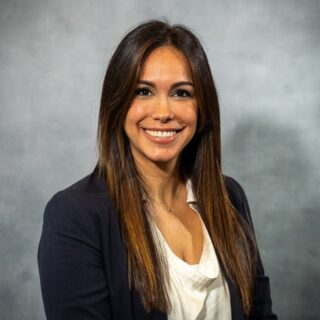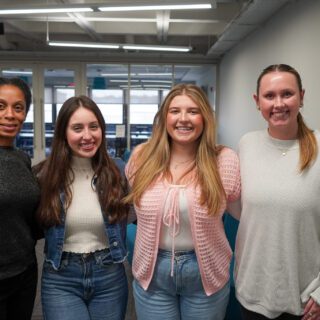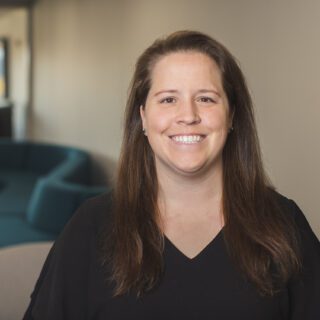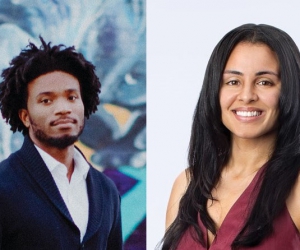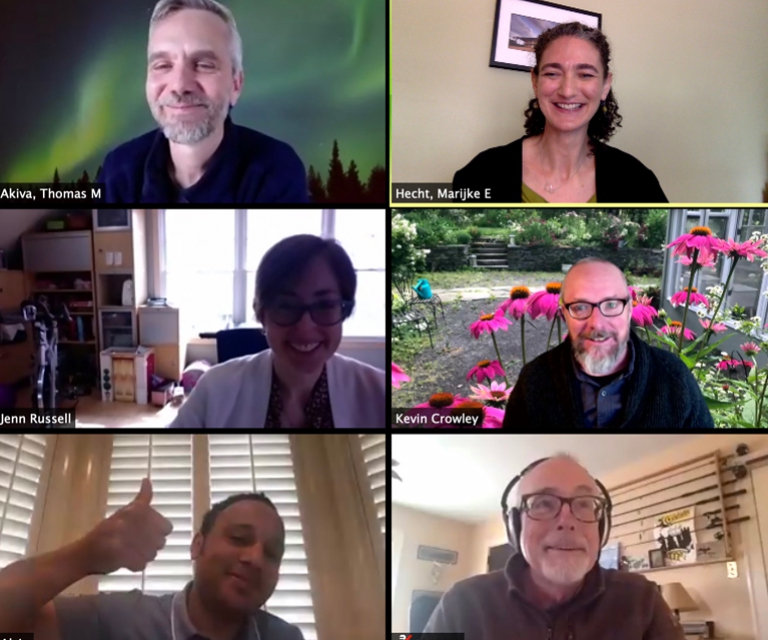
Virtual Dissertation Defense Facilitates Connection in Time of Social Isolation
After four years of intense work as a PhD student in the University of Pittsburgh School of Education, Marijke Hecht’s big day as a scholar was almost here. Her dissertation defense—an occasion set months in advance that, if successful, would be her culminating achievement as an emerging researcher—was scheduled for March 18, 2020.
Then the coronavirus happened.
Like millions of others, Hecht had to quickly change her plans in wake of the deadly global pandemic. Holding her dissertation defense in person was now impossible due to strict social distancing protocols. Every day, reports of confirmed infections were climbing locally and globally.
Hecht wouldn’t let that stop her. With the support of her dissertation committee in Learning Sciences and Policy, she pivoted to a virtual dissertation defense. She conducted her dissertation, one the day it was originally scheduled no less, via the Zoom video-conferencing service. The defense was attended by all of the dissertation committee members, including one member from California, and the experience didn’t miss a beat.
Hecht delivered a prepared 30-minute presentation via the screen sharing tool, followed by a facilitated discussion and questions via the interactive video chat. The dissertation members were able to hold discussions in private via a virtual rooms feature. It is believed to be the first entirely virtual dissertation defense at the School of Education and is also one of the first at the University of Pittsburgh.
“It was obviously very different than I expected it to be, but there were also some nice aspects to it, too,” said Hecht.
For example, the online session allowed Hecht to invite friends, family, and professional colleagues who normally could not have attended in person, which brought the total number of participants to nearly 40 people. They were able to interact with Hecht by typing questions into a chat box.
“For a PhD candidate, the dissertation defense, ideally, is a celebration of all of the years of work and is an opportunity to share with people that you love exactly what it is that you have been doing for all of these years,” said Hecht.
Hecht’s dissertation was titled “Relational processes between people and place: Understanding environmental interest and identity through a learning ecosystem lens.” It draws on her 20 years of professional experience in the education and nonprofit sector. Most recently, she was director of education for the Pittsburgh Parks Conservancy and previously taught math and science education in public schools in New York City.
“Learning ecosystems is an effort that understands that learning happens throughout our lives and in all different places,” said Hecht. “Oftentimes, it takes place in K-12 settings, but it also happens at home, independently outside of school, and through informal, semi-structured programs such as the Boy or Girl Scouts.”
On her dissertation committee, Hecht was supported by some of the world’s preeminent experts in learning ecosystems and out-of-school learning. Kevin Crowley, associate dean for faculty and research at the School of Education, served as Hecht’s dissertation chair. Joining him on the committee were Tom Akiva, associate professor and director of the EdD program; Jennifer Lin Russell, associate professor and chair of the department of Educational Foundations, Organizations, and Policy; Alvin Pearman, assistant professor at the Stanford Graduate School of Education (and former Center for Urban Education faculty member); and Steve Tonsor, Daniel G. and Carole L. Kamin Interim Director of the Carnegie Museum of Natural History.
Crowley commended Hecht for her detailed approach in addressing “life-long, life-wide learning pathways” through a systems-based approach.
“Marijke argues that, in order to address equity and justice, we must start seeing the system, and then intervene in ways that result in sustainable, systemic change. Her work is pushing the cutting edge of theory,” said Crowley.
Akiva agreed. “Marijke was already a leader when she came to Pitt, having been the education director of a large staff and having managed things like the green construction of a large nature education center. She managed to build from this leadership and practical experience to add those to her scholarship, spinning them into very successful research-practice partnerships,” said Akiva.
At the close of her dissertation defense came the moment of truth. This is when Hecht was to find out if she passed her dissertation defense.
Hecht passed with flying colors. No revisions to her dissertation would be required.
Under normal circumstances, this moment would have been a time of hugs and high fives. However, since this was a virtual session, Crowley had something else in mind to mark the occasion. He instructed all the participants on the call to unmute themselves and give Hecht a hearty round of applause.
They were more than happy to oblige.
“That was really cool and a super sweet moment,” recalls Hecht with a smile.
Hecht’s dissertation defense was anything but normal. Yet, after years of preparing for that moment, it is an experience that she won’t soon forget.
Learn More
Faculty at the School of Education are encouraged to continue with dissertation defenses through virtual video-conferencing.
Here are some tips for a successful session:
-
Access the Zoom video-conferencing service through your Pitt credentials at https://pitt.zoom.us/
-
The faculty member should be the co-host of the meeting so they also have the power to mute participants who forget to mute themselves
-
The host should point out to participants the Chat feature before you begin and invite questions from the audience
-
Every participant should have their video on for the beginning and for the questions.
-
The tile view rather than the speaker view is encouraged as it feels more like being in a room full of people. But for the talk itself, you may want to invite everyone except the committee to turn off their video so that Zoom will only display the committee’s faces. That way, when the candidate shares their screen and does the presentation, they can keep an eye on the committee
-
If the candidate wants to, you can record the defense. This will help them keep track of questions and will create a permanent record that may be fun to look back on years later

